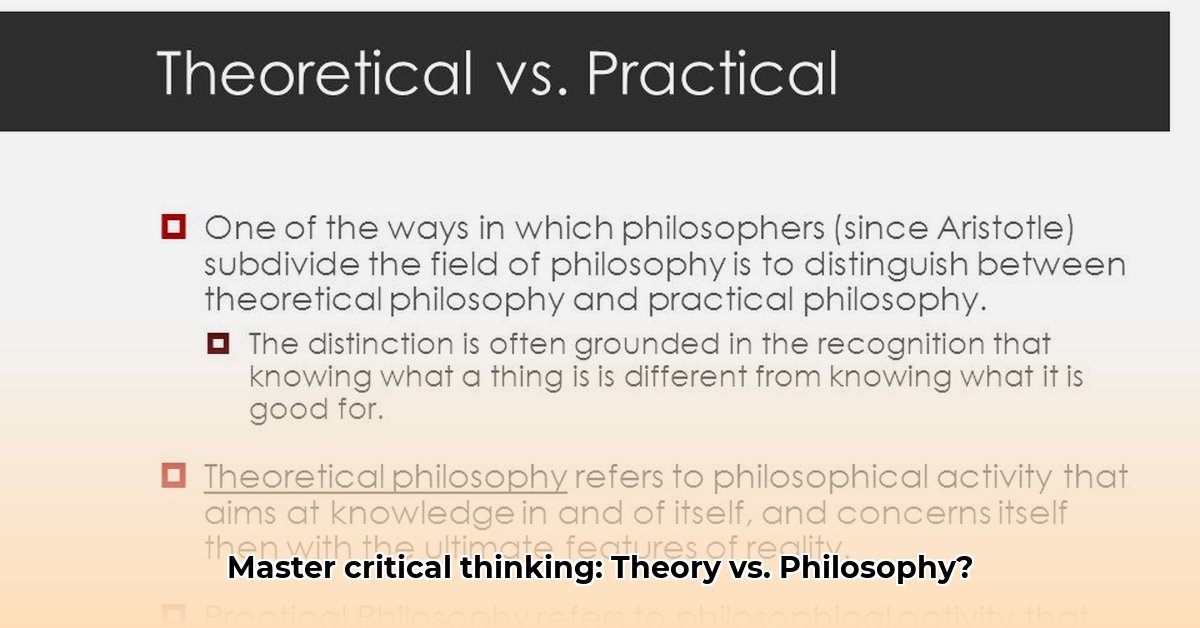
Ever feel lost navigating complex ideas? This guide clarifies the relationship between philosophy and theory, providing practical tools for clearer thinking and decision-making. We'll explore how these approaches work together, empowering you to apply this knowledge immediately.
Understanding the Fundamental Difference: Philosophy vs. Theory
What distinguishes philosophy from theory? Simply put, philosophy tackles broad, fundamental questions about existence, knowledge, and values—the "big picture" inquiries that have captivated thinkers for centuries. Theory, on the other hand, offers explanations for specific phenomena within a particular field. It’s a more focused, detailed examination of a specific aspect of reality. Think of philosophy as setting the stage, providing the overarching framework, while theory provides the detailed script within that framework.
How Philosophy Underpins Theory: The Unseen Architecture
While seemingly abstract, philosophy forms the bedrock of many theories. It provides the underlying assumptions and perspectives that shape the research question and methodology. For example, a researcher studying effective disease treatments implicitly relies on philosophical views about the value of human life and what constitutes a "good life"—these beliefs influence their scientific approach significantly. Different ethical frameworks—consequentialist, deontological, etc.—would lead to different research paths. The very method of scientific inquiry is frequently guided by philosophical viewpoints.
Where They Diverge: Evidence and Methodology
A key difference lies in the approach to evidence. Theories rely heavily on testable, observable evidence, such as experiments or data analysis. While philosophers also utilize logic and reasoning, their arguments don't always require the same type of concrete evidence. They might use thought experiments or conceptual analysis. This does not imply superiority of one over the other; they're complementary tools for understanding the world. Do you agree that this combination is crucial for comprehensive understanding?
The Synergistic Relationship: A Powerful Partnership
The relationship between philosophy and theory is dynamic and reciprocal. Philosophical ideas can refine and improve existing theories, suggesting new research avenues. Conversely, theoretical advancements illuminate philosophical debates. For instance, breakthroughs in neuroscience are reshaping our understanding of consciousness, directly impacting age-old philosophical questions about the mind. This interplay continually evolves and enhances our knowledge.
Applying the Framework: A Step-by-Step Guide
Let's apply this understanding practically. Here's a five-step guide to integrating philosophy and theory into your thinking:
Define the Problem: Clearly articulate the issue you're exploring. Is it a scientific question, ethical dilemma, or social problem? This context guides your choice of philosophical and theoretical approaches. What are your initial assumptions?
Explore Philosophical Perspectives: Research relevant philosophical viewpoints and historical perspectives on the problem. What are the underlying assumptions and values?
Investigate Existing Theories: Examine current theories within the relevant field. What are their strengths, weaknesses, and underlying assumptions? Are there competing theories?
Identify Connections: Integrate your philosophical insights with the evidence supporting the theories. Do the philosophical assumptions align with, challenge, or refine the theoretical framework?
Draw Informed Conclusions: Synthesize your findings to form well-supported conclusions, informed by both philosophical and theoretical perspectives.
Real-World Applications: Illustrative Examples
Here's a table illustrating the interaction of philosophy and theory across diverse fields:
| Field | Relevant Philosophy | Relevant Theory | Synergistic Application |
|---|---|---|---|
| Climate Change | Environmental Ethics | Climate Models | Ethical considerations inform climate action strategies. |
| Artificial Intelligence | Ethics of Technology | Machine Learning Algorithms | Philosophical inquiry shapes the ethical development of AI. |
| Social Justice | Political Philosophy | Theories of Social Inequality | Philosophical ideals underpin social justice initiatives. |
| Medical Research | Bioethics | Drug Testing methodologies | Ethical guidelines shape research methods and practices. |
| Economics | Political Economy | Economic Models | Philosophical assumptions about human behavior impact economic models. |
Critical Thinking: The Key to Effective Application
Mastering the interplay between philosophy and theory isn't merely academic; it's crucial for effective critical thinking. Recognizing the underlying assumptions and limitations of both allows for more thoughtful problem-solving, well-reasoned opinions, and productive discussions. This approach empowers informed judgments and meaningful engagement with complex issues. It's a journey of continuous learning and refinement.
Enhancing Scientific Theory Development Using Philosophical Frameworks
Key Takeaways:
- Philosophy provides essential conceptual frameworks and ethical guidelines for scientific endeavors.
- Science offers empirical evidence, enabling the refinement and testing of philosophical theories.
- Integrating both enhances the rigor, relevance, and ethical soundness of scientific research.
A Practical Guide: Integrating Philosophy and Science
How do we effectively integrate philosophical frameworks into scientific theory development? This involves a strategic approach combining abstract reasoning and empirical investigation:
Identify Core Assumptions: Examine the underlying beliefs supporting your scientific theory. Are they consistent? Are there alternative perspectives?
Assess Ethical Implications: Consider the potential societal impacts, risks, and benefits. Philosophical ethics guide the evaluation of moral dimensions.
Refine Research Design: Use philosophical analysis to enhance the research design, addressing potential biases and limitations.
Contextualize Results: Interpret findings within a broader philosophical framework. How do these results impact our understanding of the bigger picture?
Engage in Critical Self-Reflection: Continuously evaluate the strengths and weaknesses of both your theory and methodology. What further investigation is needed?
Example: The Development of Artificial Intelligence
In the rapidly evolving field of Artificial Intelligence (AI), philosophical inquiry into consciousness, intelligence, and ethics is critical for responsible development and deployment. Questions regarding AI bias, autonomy, and societal impact require philosophical engagement beyond the purely technical aspects.
The Benefits of Integration
This integrated approach fosters critical thinking, enhances research design, and promotes societal well-being. It's a powerful synergy, surpassing a simple additive effect. It leads to more robust, relevant, and ethically sound science.